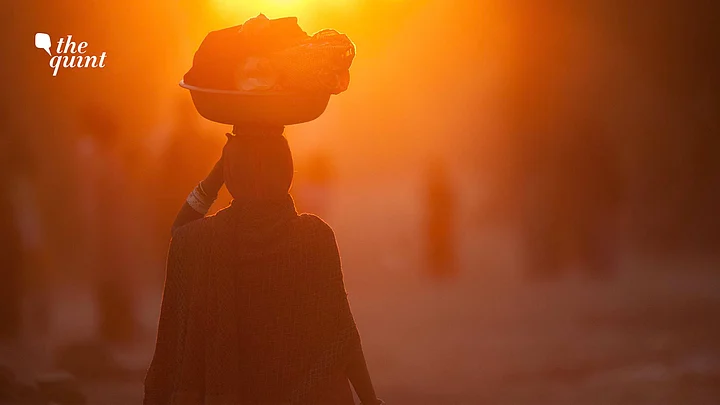Gayatri Devi is a farmer and an Auxiliary Nurse Midwife hailing from Manikpur village in Chitrakoot district of Uttar Pradesh. The strength and confidence she exudes as an independent, single mother, who farms her own land, belies the struggles that she has faced for removing the limits to her independence.
She does not have property rights over the land she farms, ever since her husband passed away more than twelve years ago.
‘Land Rights for Women Can Ensure Freedom From Bondage’
Despite her in-laws’ opposition, she has been fighting for property rights over the land with the village pradhan. She says, “If a man is truly wise, and wishes her to not be a slave, he would leave at least 50 percent of the land under his wife’s name.”
Indeed, having land under one’s name can ensure a woman’s freedom from bondage – both physical and economic – by deterring violence as well as being a dependable source of income.
Even in cases where she faces domestic violence, it becomes a tangible option for exit, as noted by economist Bina Aggrawal. However, Gayatri Devi is an exception in her realiaation of this truth. She has also been urging other widows in the village to claim their rights as well. But they would rather excuse themselves or die of starvation, she shared.
‘Women Care for Both House & Farm, But Have No Property Rights’
Like Gayatri Devi, Rambati a farmer from Jhansi ,Uttar Pradesh, and President of the district Kisan Union, also helps other women fight for their rights over land. But despite teaching others about the law, she has not been able to make her own family understand. She says, “Women not only take care of the house but also the farm. And yet she gets no rights over land and property. Neither government nor any individual man has given any rights to us. Though we are far better than men intellectually and physically, they do not let us get ahead. They get drunk and beat us up and tell us that we are worth nothing. A woman with no means will just keep giving and giving until she dies. ”
Domestic violence and crimes against women are among the highest in Uttar Pradesh, but one little known fact is its poor records with respect to women’s land ownership too.
According to an index created by the Center for Land Governance, only 6.1 percent of all land holdings are held by women in Uttar Pradesh. The national average is 12.9 percent. In a place like Bundelkhand, which witnesses the highest rates of migration for work by male members in the family, the problem acquires more significance in the light of the fact that fields are left to be taken care of by women .
95.9 % Women in Bundelkhand Don’t Own Land in Their Name
Ramdulari, another woman from Chitrakoot, offers an example. She has been managing the farm alone for 20 years d taking care of four children alone, since her husband migrated for work. She is fighting to get the land in her name, like a few other women in the village. She says, “My husband has been migrating to other states ever since he was very young due to the need of money in his family. This has continued after our marriage.”
Ramdulari’s situation is reflective of a national level phenomenon. The Economic Survey 2018 states that, as more men migrate to urban areas and non-farm sectors, women’s growing responsibility as workers and farm managers is leading to increasing ‘feminisation’ of agriculture. Despite this, according to the most recent statistics by the National Council for Applied Economic Research (NCAER), women constitute 42 percent of farm labour in the country, and yet own 2 percent of total agricultural land.
Ramdulari further shared why it was important for her to gain property rights.
“My husband is not very smart, and can be easily manipulated or coerced into giving up his land, but if it’s in my name, I will fight for it no matter the humiliation and abuse.”
Ramdulari, Rambati and Gayatri Devi’s stories of grit in the face of odds may be exceptions in the patrilineal settings that they are set to break. But they represent the 95.9 percent women of Bundhelkhand who don’t own land in their name.
(Khabar Lahariya is a rural, video-first digital news organisation with an all-women network of reporters in Bundelkhand. This is an opinion piece and the views expressed above are the author’s own. The Quint neither endorses nor is responsible for the same.)
